Other highlights include the buzz of his first opening ceremony in Barcelona 1992, late-night barbecues in Sydney 2000 and returning to ancient Athens in 2004.
The Tokyo Olympics will be Chris Perry’s eighth with the Hong Kong rowing team. The head coach at the Hong Kong Sports Institute has been with the team for 35 years but he was recruited in 1986 from Britain only on a short-term contract to prepare rowers for the Asian Games that year.
With experience working with the British team and coaching the Oxford University boat crew, Perry arrived in Hong Kong more out of curiosity about Asia than anything else, knowing he would be working with a small amateur squad of firefighters, teachers and university students.
He had no clue that it would turn out to be a lifelong journey that continues to this day, having eventually married one of Hong Kong’s top rowers, Ho Kim-fai, and becoming an iconic part of the Hong Kong sports scene.
Here Perry talks about his memories from each of the seven Olympics he has attended as he looks forward to No 8, the “Pandemic Games” in Tokyo.
Barcelona 1992: first-ever opening ceremony
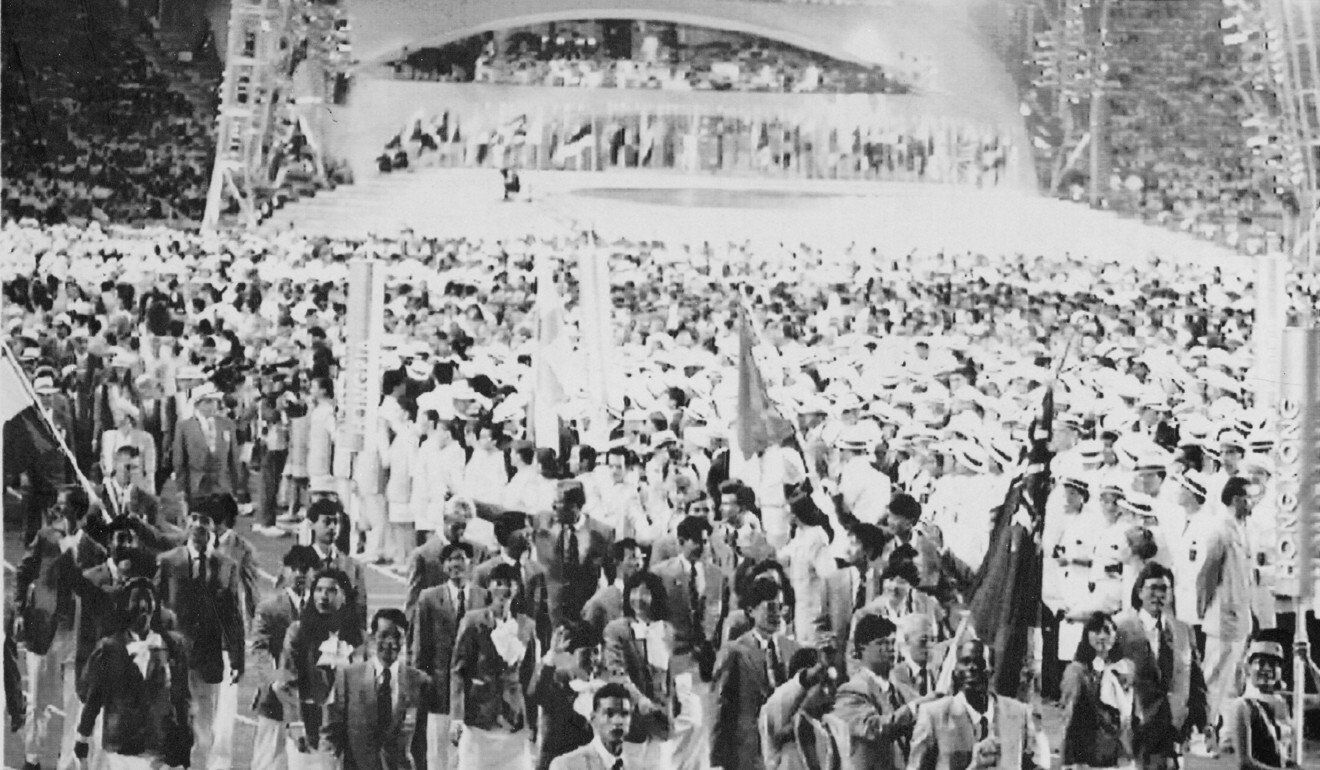 The Hong Kong team march at the 1992 Barcelona Olympics opening ceremony.
The Hong Kong team march at the 1992 Barcelona Olympics opening ceremony.
In July 1992, Perry was waiting for the announcer to call the Hong Kong delegation into the Montjuïc Olympic Stadium in Barcelona, Spain. In a few moments the staple parade of athletes would begin, but for now the coach was standing among thousands of sporting elites sweating in the summer heat.
To him, Barcelona 1992 was one of many firsts. Never before had he marched into an Olympic opening ceremony; never before had Hong Kong fielded a rowing team to the Olympics. And on a personal note, his wife, Ho Kim-fai, was there as the then colony’s top rower.
Soon enough, it was Hong Kong’s turn. Perry, with other coaches and athletes, walked through a dark tunnel to emerge before a bowering crowd of fans cheering loudly, clapping and ceaselessly flashing their cameras.
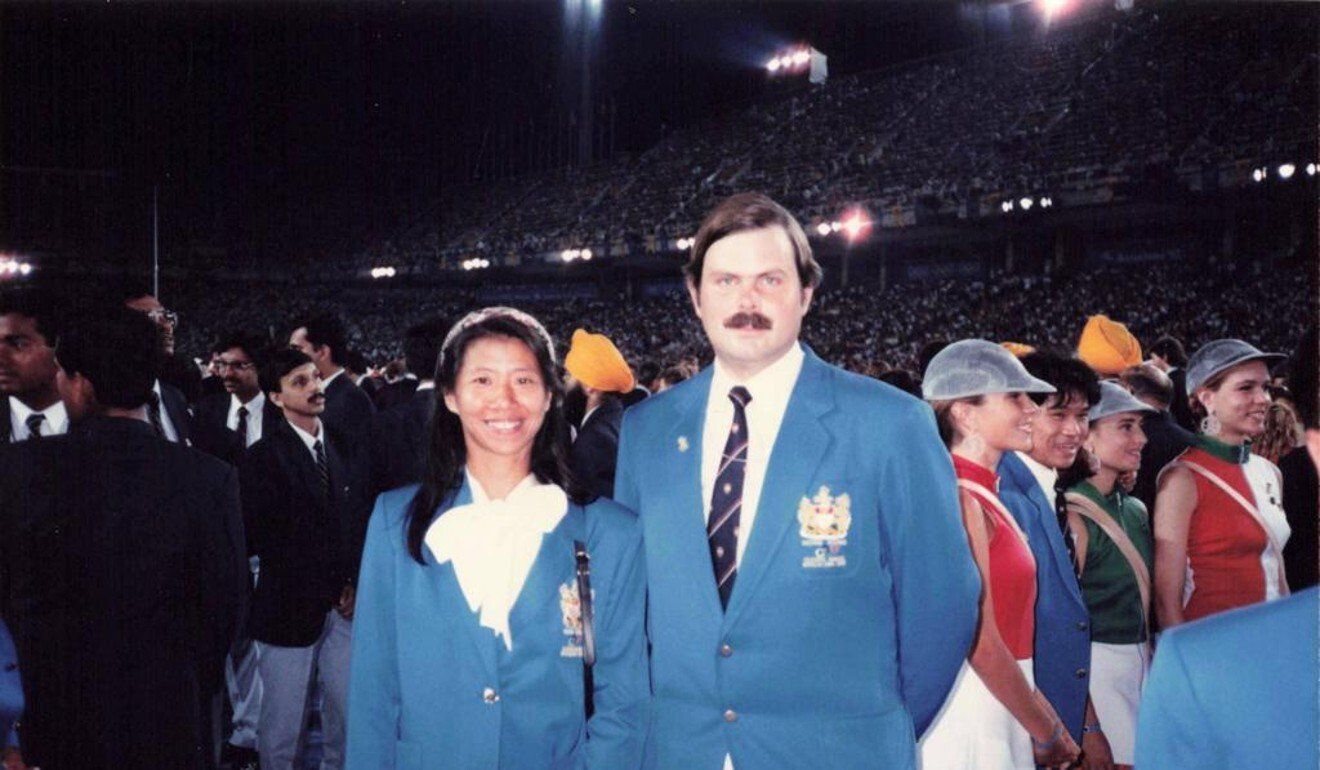 Chris Perry and his wife, Ho Kim-fai, at the 1992 Barcelona Olympics opening ceremony.
Chris Perry and his wife, Ho Kim-fai, at the 1992 Barcelona Olympics opening ceremony.
“It’s just an amazing feeling that you’ve just come out into this incredible field of being in this worldwide stadium with hundreds of other countries and athletes,” Perry said.
Barcelona was also a first for 12 former Soviet republics, which competed in the Unified Team but marched with their national flags. Only a year ago did the Soviet Union fall, after dominating the medal table for decades in sports such as athletics, gymnastics and weightlifting.
Former Soviet athletes competed for their own countries, including Lithuania and Latvia, who made their post-Cold-War Olympic debut. The Eastern Bloc was also no more, with the German Olympians competing under a single flag for the first time after reunification.
With the fall of the dominant sporting nation, Barcelona was a chance for everyone else to shine, Perry said. “Many of those athletes who have been in the Soviet Union were still around, but they were able to represent their own country,” he said. “It made the playing field a bit more level.”
Atlanta 1996: gold for Hong Kong and Centennial Park bombing
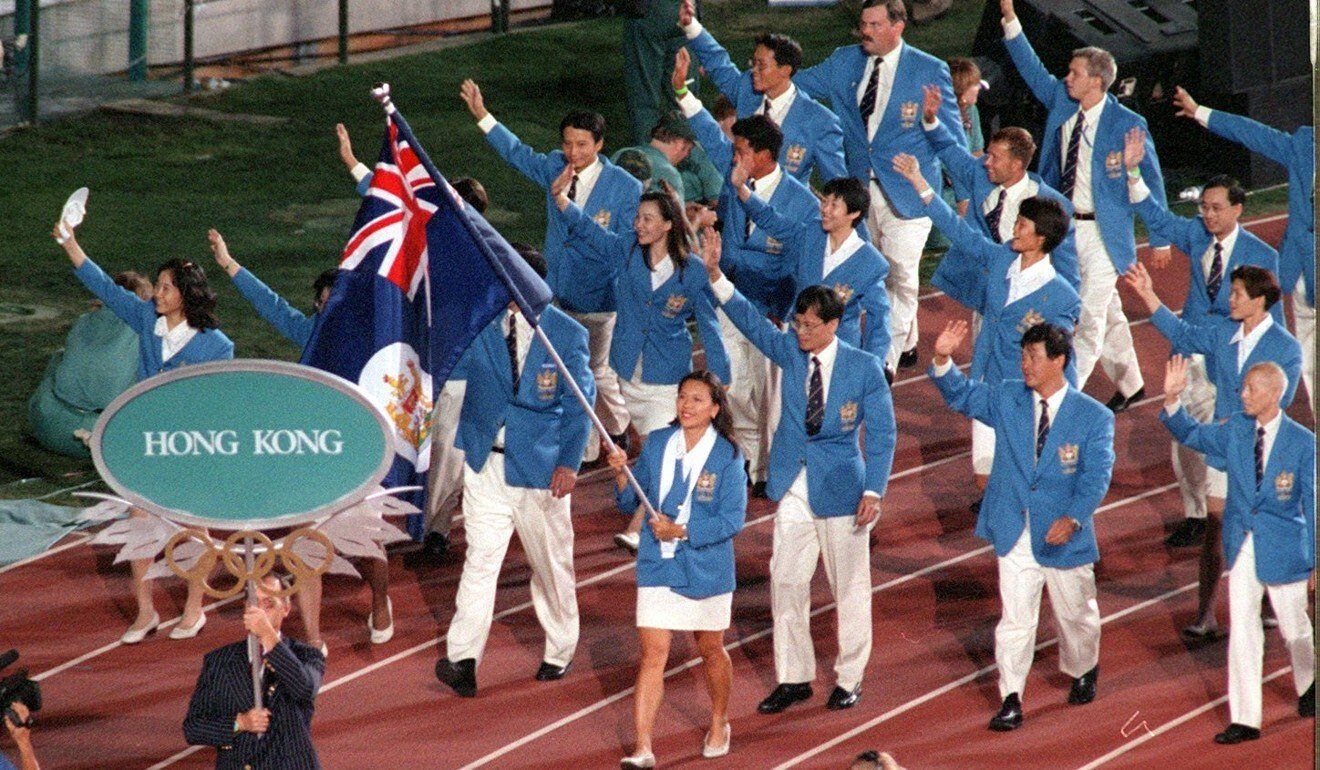 Chris Perry (top right) marches with the Hong Kong team at the Atlanta Olympics opening ceremony in 1996.
Chris Perry (top right) marches with the Hong Kong team at the Atlanta Olympics opening ceremony in 1996.
The 1996 Atlanta Games have a special place in the heart of the people of Hong Kong, as the city earned their first medal with a gold for Lee Lai-shan in women’s windsurfing. Perry and his athletes had finished their races and drove 400km (249 miles) through heavy traffic to the picturesque seaside city of Savannah, where the sailing events were held.
Lee was on her last race when Perry and the rowers stood on the beach, anticipating her return. They couldn’t see San San’s race but they were told after she crossed the finish line that she clinched gold. “You knew that the gold medal was there. And that was the first-ever moment. So I was very privileged to be there,” Perry said.
Lee sailed to the beach on her board with a huge smile as everybody cheered for Hong Kong’s home-grown champion.
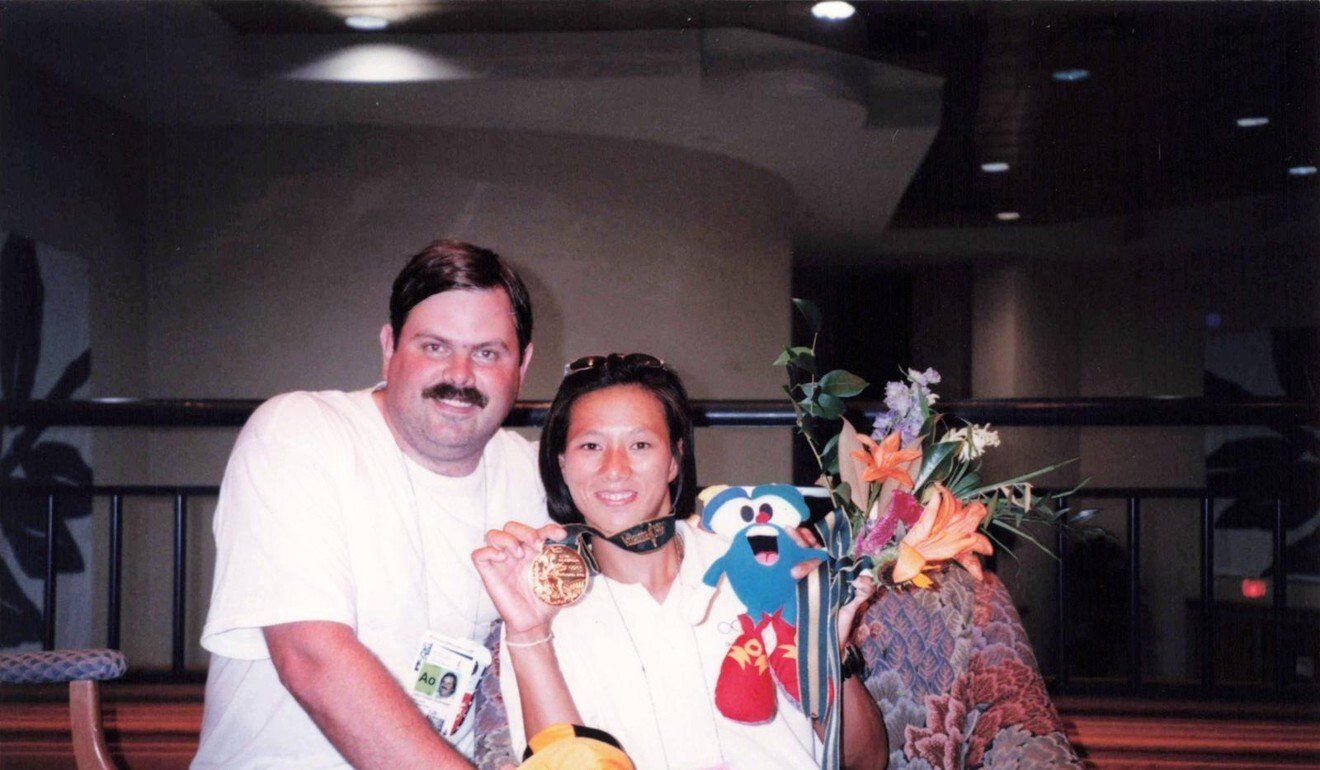 Chris Perry with Lee Lai-shan after she won her gold medal at the Atlanta Games.
Chris Perry with Lee Lai-shan after she won her gold medal at the Atlanta Games.
In addition to Hong Kong’s glory moment, the Atlanta Games were marred by a bombing at the Centennial Olympic Park, which killed a woman and injured 111 other people. Just two days before, Perry and his team were at the park on the famous giant catapult ride that fired people into the air.
“I guess we felt lucky that we hadn’t been there on the day that the bomb had gone off,” he said.
The Olympic Village had extra police checks and controls as the organisers doubled down on security. “That was very annoying. But at the same time, it was understandable. But of course we were very, very sad for the person who lost their life there.”
What made Atlanta Perry’s least favourite of the seven Games was not the bombing but what he saw as blatant commercialisation of the Olympics. From the Coca-Cola Olympic City to the AT&T Global Olympic Village, logos and advertisements were littered all over the corporate city of Atlanta.
 Centennial Park in Atlanta after the bombing.
Centennial Park in Atlanta after the bombing.
“All Olympics are commercial. We know that the Olympics can’t survive [without that]. But I think you can do it in a subtle way, or you can do it in a very blatant way. And I think in the US, it was too blatant,” Perry said.
“Some people said even the Olympic cauldron in the stadium looked like a packet of French fries.”
Sydney 2000: late-night barbies and friend Steve Redgrave’s fifth gold
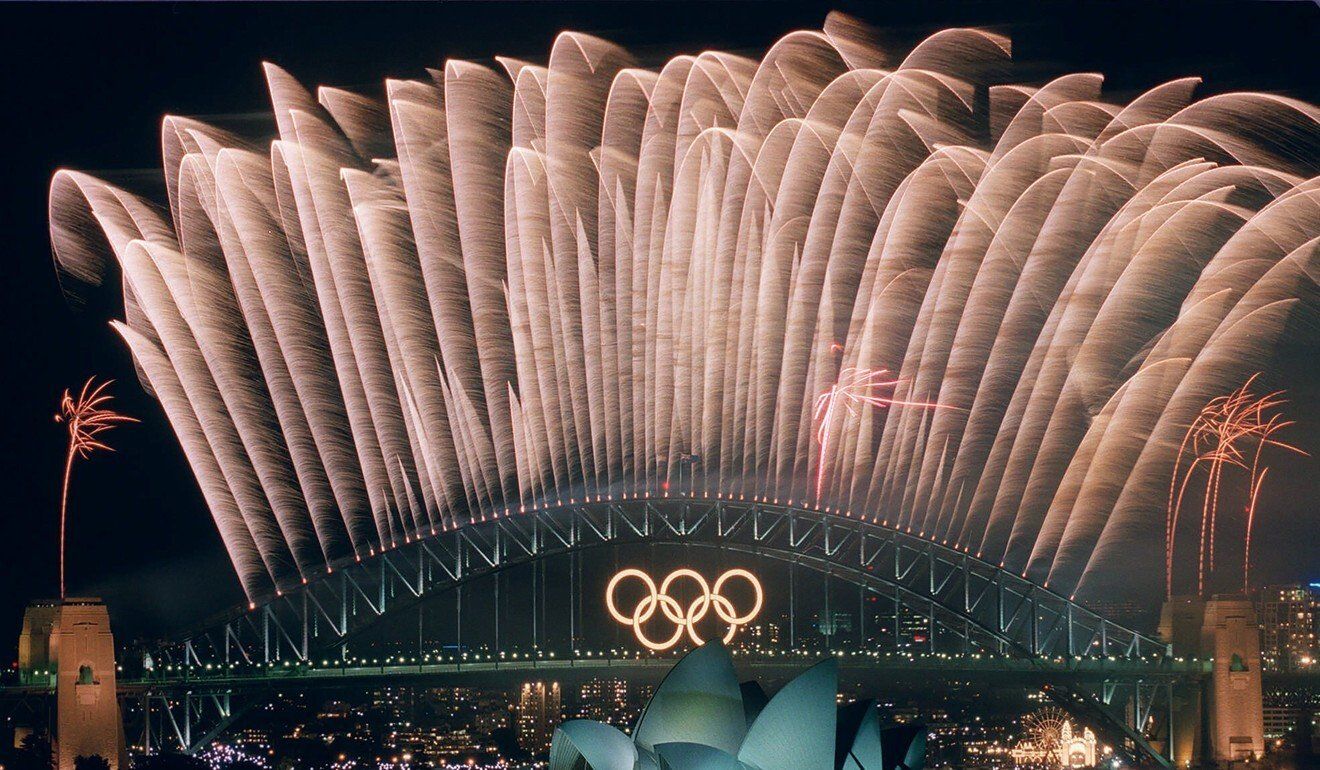 Fireworks explode into the sky during the closing ceremony of the Sydney 2000 Olympic Games.
Fireworks explode into the sky during the closing ceremony of the Sydney 2000 Olympic Games.
The Sydney Games were the best organised Olympics in Perry’s memory, and worked “in a very relaxed Australian way”.
Barbecues were set up in the Olympic Village after the opening ceremony, which ran until late at night. “So you were hungry after the ceremony, and it was two o’clock in the morning and you could still have a barbecue outside,” Perry said.
In Sydney, Hong Kong competed for the first time as “Hong Kong, China” and new oars in red with the Bauhinia flower made their debut at the Olympics.
“I’m always proud as a coach to represent Hong Kong. It’s been most of my life’s coaching work. I was very proud, still, to be a member of the Hong Kong team,” he said. “As soon as the handover happened, for rowing, we immediately changed our colours in the same year.”
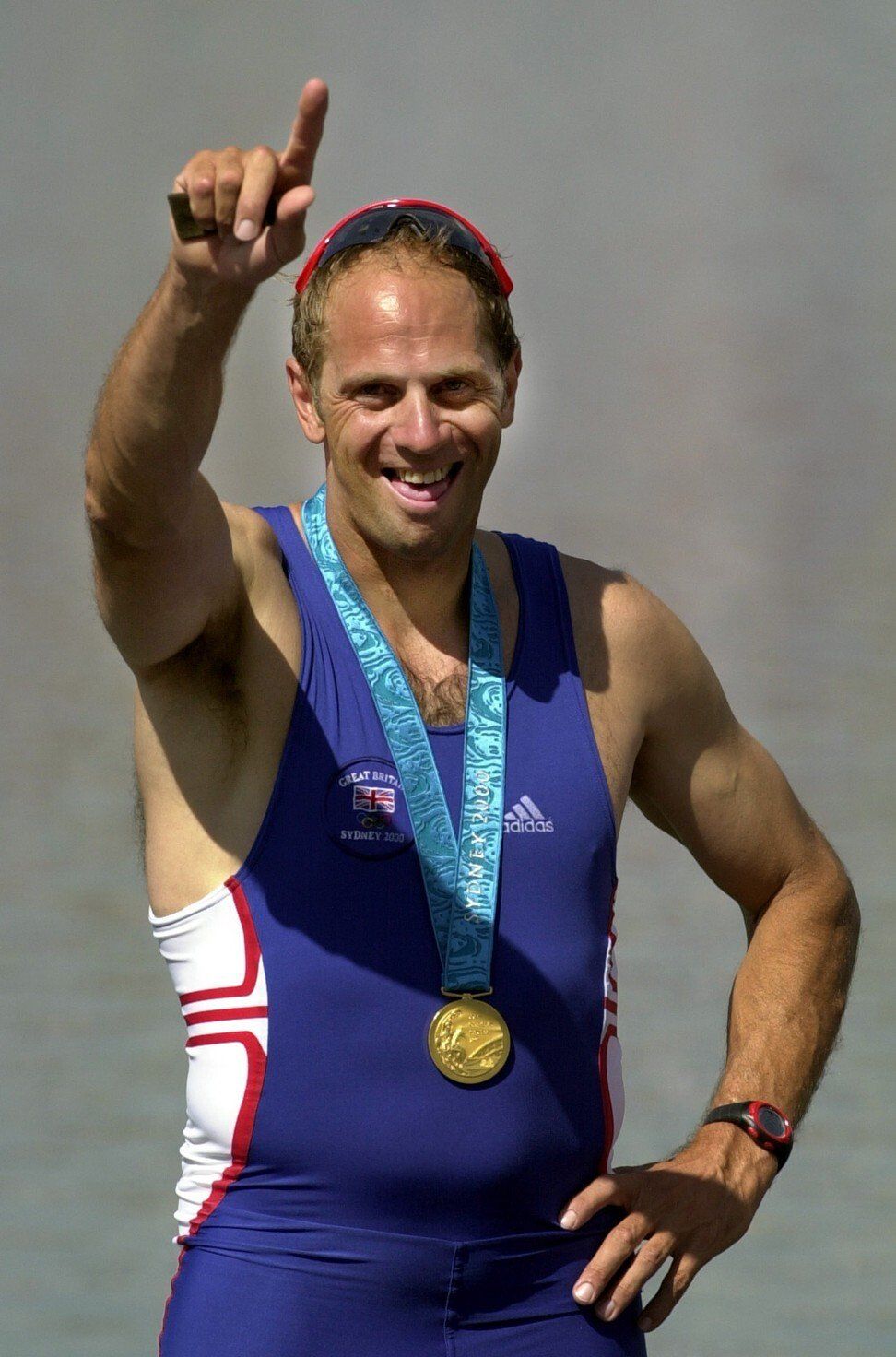 Britain’s Steve Redgrave celebrates his fifth Olympic gold medal during the Sydney Games.
Britain’s Steve Redgrave celebrates his fifth Olympic gold medal during the Sydney Games.
The Sydney Olympics was also special to Perry as British rower Steve Redgrave had won his fifth rowing gold medal at his last Olympics. Perry rowed with Redgrave on the British junior sculling squad and stood at the finish line to watch his friend win his fifth and last Olympic gold.
“Up until that time, no endurance athlete – that means someone who does long endurance sport – had won five gold medals in five successive Olympics,” said Perry, who still kept regular contact with Redgrave.
Redgrave retired after Sydney and is now the technical director of the Chinese rowing team.
Athens 2004: returning to ancient times
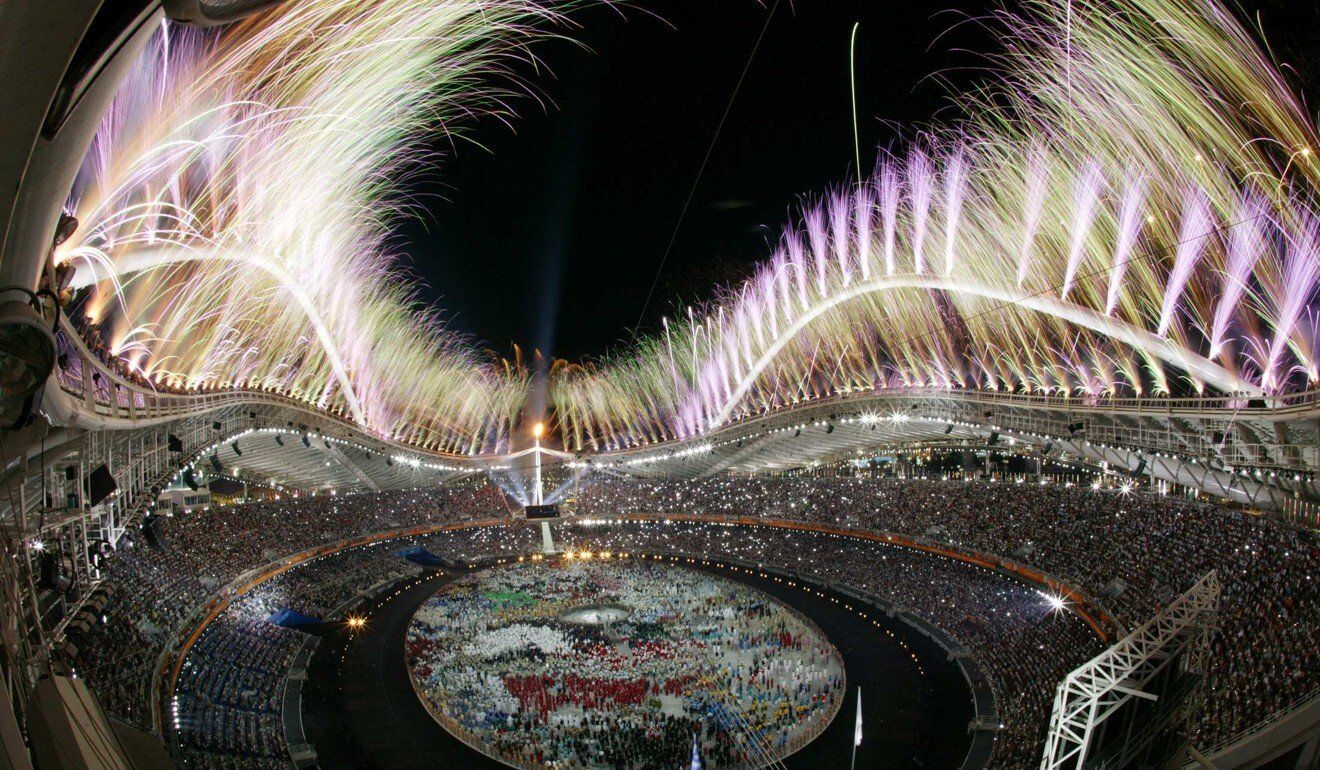 Fireworks light up the Olympic Stadium in Athens during the opening ceremony for the 2004 Games.
Fireworks light up the Olympic Stadium in Athens during the opening ceremony for the 2004 Games.
Holding the Olympics in the capital of Greece, the home of the ancient Games, was special to every sportsperson, Perry said. As modern tradition dictates, the flame of every Games is lit from the mountains of Olympia in Greece.
But the symbolic meaning of a Greek Olympics was overshadowed by controversies over costs and readiness of Athens to welcome the world.
“Before the Games, everybody said, ‘the Greeks, they’ve got no money, they’re completely disorganised, they will never be able to run the Olympic Games’,” he said, adding that some were even anticipating a cancellation only days before the opening ceremony.
“What was amazing is the Greeks did everything. They got it all right at the last moment. So, two days before the Olympics, everything was ready,” Perry said with a laugh. “They did their country so proud. But nobody believed that it was going to happen.”
To pay homage to the ancient origins of the Olympics, the marathon race in Athens began in the town of Marathon and finished at the Panathenaic Stadium, which staged the opening and closing ceremonies for the 1896 Olympics and was built on the site of the original venue for the Panathenaic Games circa 330BC, according to historians.
In 2004, Irish priest Neil Horan ran on to the course and pushed front runner Vanderlei de Lima into the crowd of spectators, adding about 20 seconds to his time. De Lima finished the race placing third but did not complain.
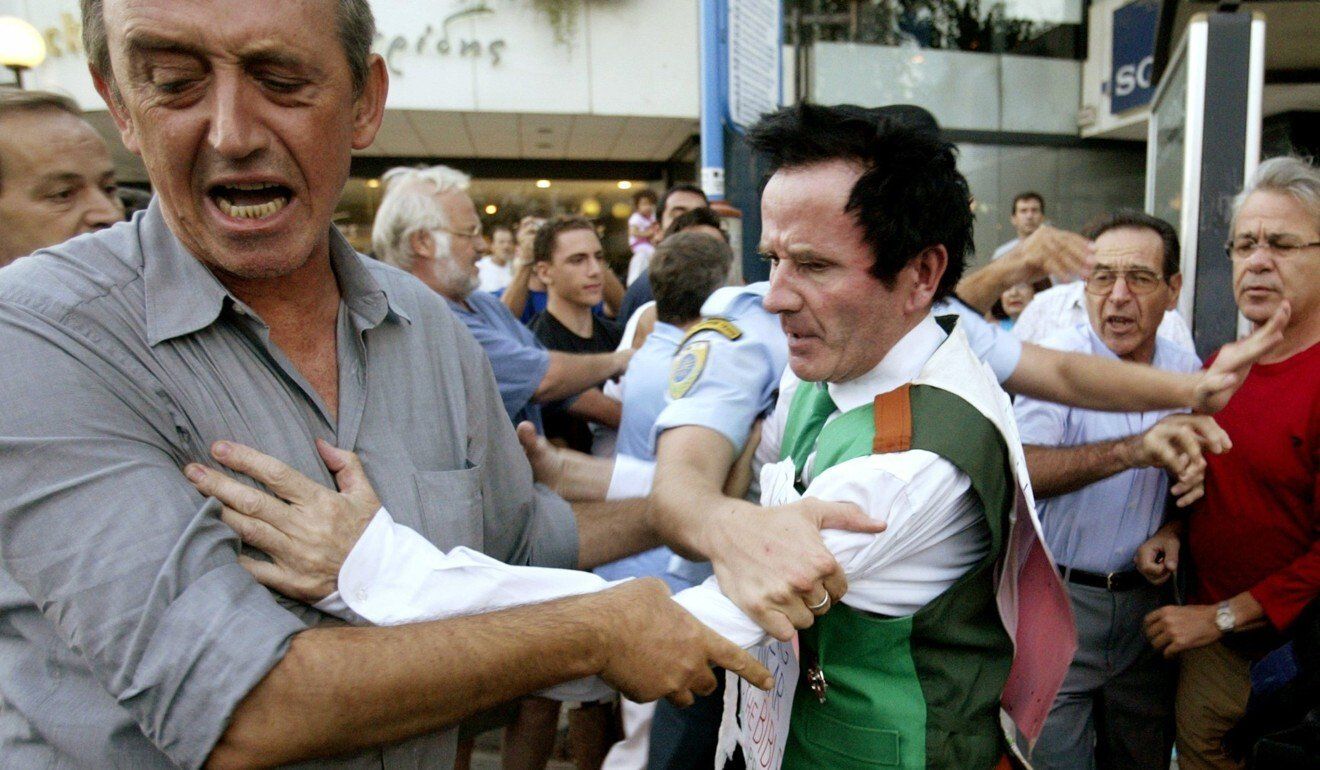 Former Irish priest Cornelius Horan (centre) is detained by spectators
and a police officer after grabbing Brazilian marathoner Vanderlei De
Lima.
Former Irish priest Cornelius Horan (centre) is detained by spectators
and a police officer after grabbing Brazilian marathoner Vanderlei De
Lima.
“He accepted his bronze medal and later on, the Olympic Committee gave him a sportsmanship medal called the Pierre de Coubertin medal for his sportsmanship,” Perry said.
The Hong Kong rowing team was not at a medal-winning stage at Athens, but the men scullers made the semi-finals, which Perry said was a big step.
Beijing 2008: warm welcome at the Peking duck Games
Everywhere the Hong Kong team went, they had a warm welcome during Beijing 2008 because it felt like a home Olympics, Perry said. “All of the local fans, all of the people in the stadium, all of the volunteers and helpers made Hong Kong feel very welcome and feel that we were part of the family,” he said.
Hosting the Olympics in Beijing gave Team China a boost of 16 more gold medals than in Athens, which Perry said was a great leap forward for the team.
The Games were also one of the records. Jamaican Usain Bolt broke two world records for his 100-metre and 200-metre sprints, and Michael Phelps of the United States won eight swimming gold medals – beating Mark Spitz’s previous record of seven – and broke seven world marks in individual and team events.
While these megastars stole the spotlight on the field and in the pool, inside the Olympic Village rose an unlikely star: the Peking duck. The village dining room opened 24 hours a day, serving athletes cuisines of every type. China, as customary, served the Peking duck as its local offering and set up a station at the centre of the room, offering the delicious delicacy wrapped in little pancakes.
“The queues every day for the Peking duck were huge. I don’t know how many thousands or hundreds of thousands of ducks they served during the Games, but it was one of the most popular things with athletes from all over the world,” Perry said.
They stood in a line for hours and loaded up their plates with 20 to 30 duck pancakes. Perry and his teammates would rush down from their dormitories to the dining room to see how long the queue was for the Peking duck.
“Even athletes who didn’t know anything about Peking duck, and have never seen it in their lives, after they tried it they were all rushing around,” he said.
London 2012: coming ‘home’ and party atmosphere in Windsor
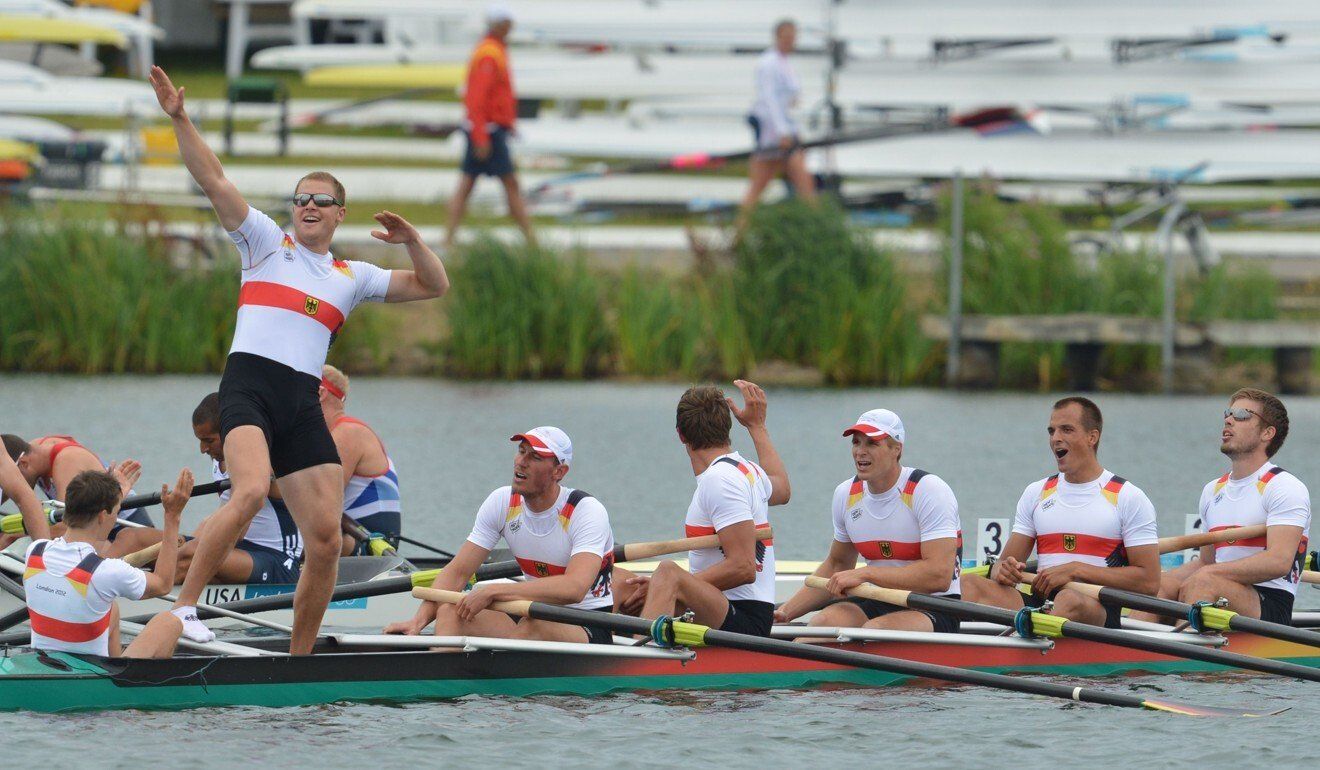 Germany’s rowers celebrate after winning the gold medal in the men’s eight final A in London 2012.
Germany’s rowers celebrate after winning the gold medal in the men’s eight final A in London 2012.
Rowing at the London Olympics was held in Windsor, a town 40km from London, and it meant Perry and his team couldn’t take part in the opening ceremony. But to Perry, rowing in England was special as the country was as much the home of the sport as it was his.
“So there are many, many, many, many rowing fans, especially in that part of the world in London, all along the River Thames, there are so many rowing clubs. So there was a massive number of supporters,” Perry said.
“Rowing is not normally a massive spectator sport compared with other major Olympic sports. But for London, the rowing spectators, the number was absolutely huge.”
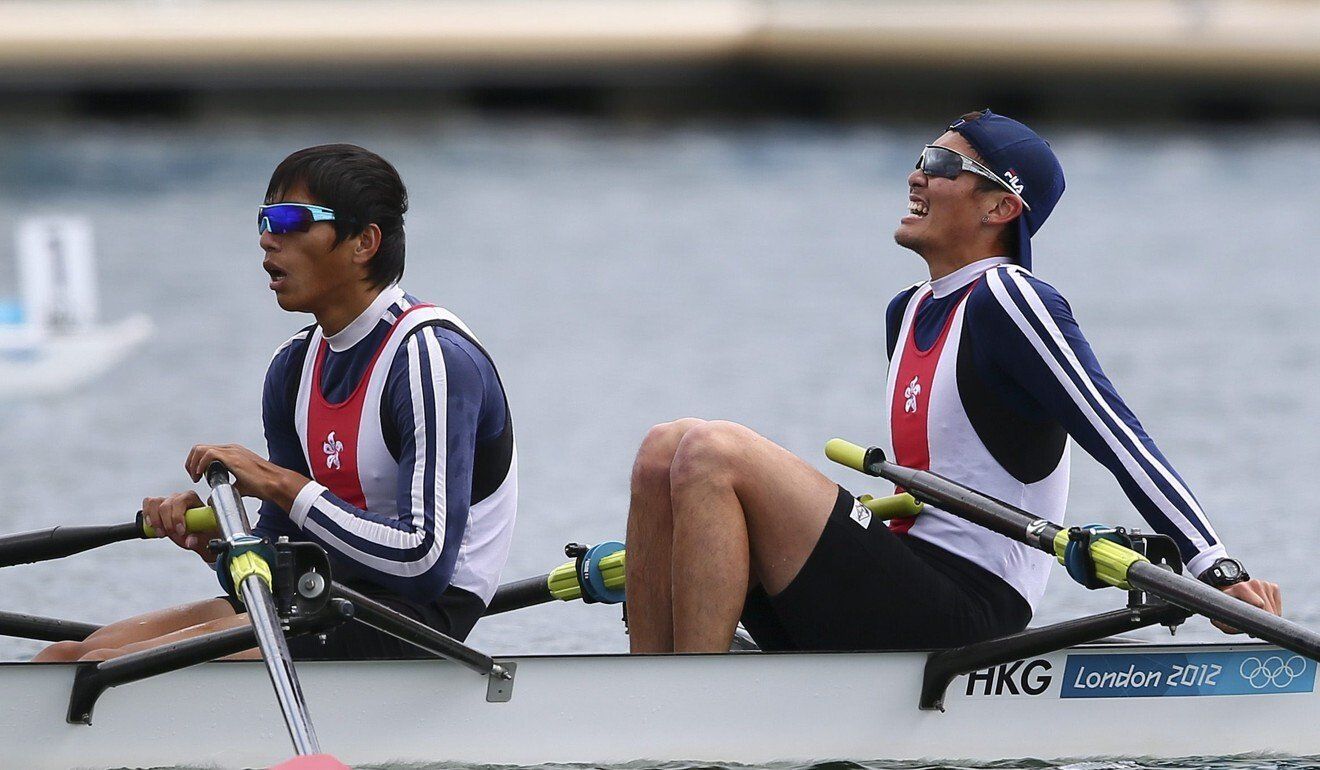 Hong Kong’s Lok Kwan-hoi (left) and Leung Chun-shek after their men’s lightweight doubles heat at the London Games in 2012.
Hong Kong’s Lok Kwan-hoi (left) and Leung Chun-shek after their men’s lightweight doubles heat at the London Games in 2012.
Unusually, they stretched 2km along the entire course. They would normally congregate at the last 500 metres, and rowers could enjoy 1,500 metres of adrenaline-filled serenity.
But the spectators at the Games were yelling and screaming and shouting from the very first stroke until the finish. No one on the rowing team – coaches or the scullers – had experienced that intensity along the entire course.
“It makes them nervous at first, for sure,” Perry said. “Our athletes definitely have never experienced that. They certainly felt quite intense, but it does also give them that adrenaline rush.”
Rio de Janeiro 2016: Zika fears and repellent-filled air
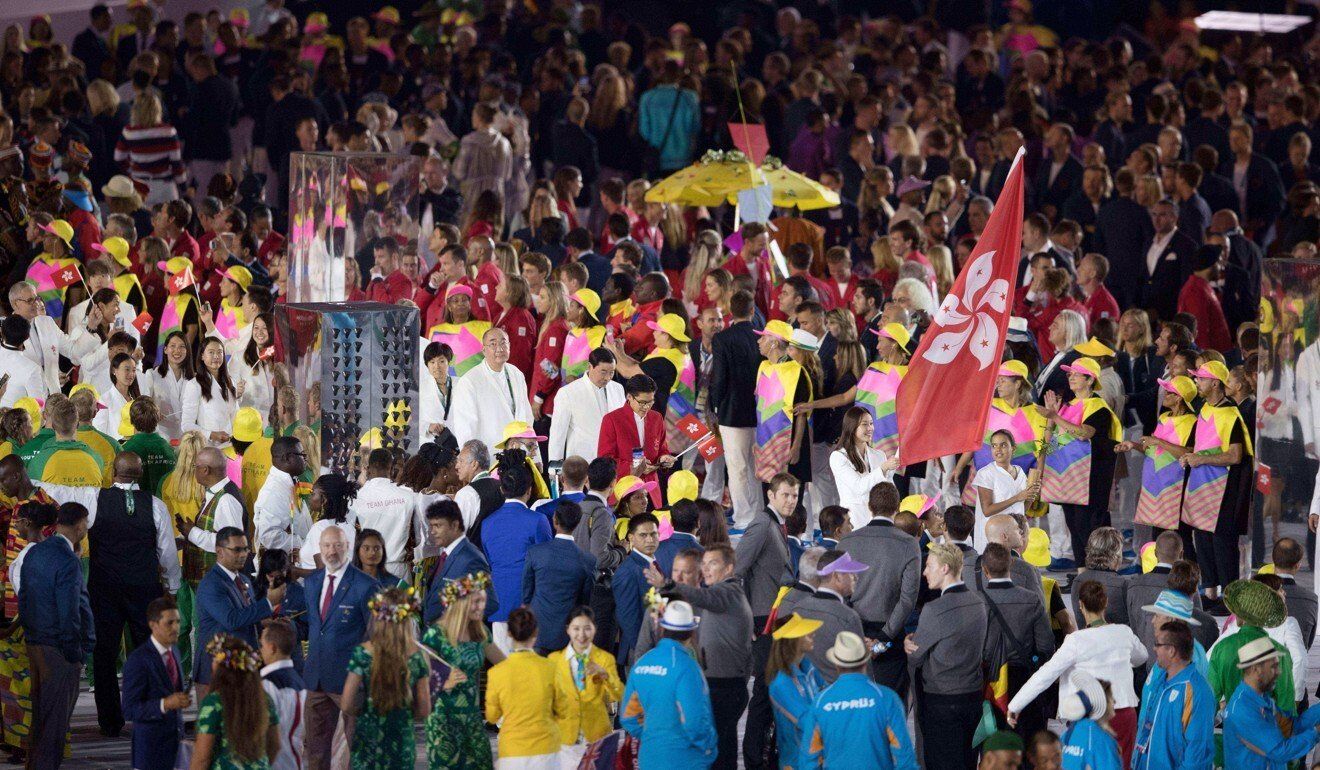 The Hong Kong squad march into the stadium for the Rio Olympics opening ceremony.
The Hong Kong squad march into the stadium for the Rio Olympics opening ceremony.
The Rio Olympics was the first Games to be held in a South American country. Brazil sold the Games as a taster for its unique carnival culture and love of life. Hovering menacingly over the enthusiasm, however, was prevailing fears of the mosquito-transmitted Zika virus.
The concern was especially strong among water sports athletes because mosquitoes are drawn to stagnant water. This was apparent to Perry when he and his rowers travelled by bus to the rowing course at Rodrigo de Freitas Lagoon by the Copacabana beach.
“The smell of mosquito repellent in the athlete transport was unbelievable. Every athlete from every country had covered themselves in Deet and insect repellents,” he said.
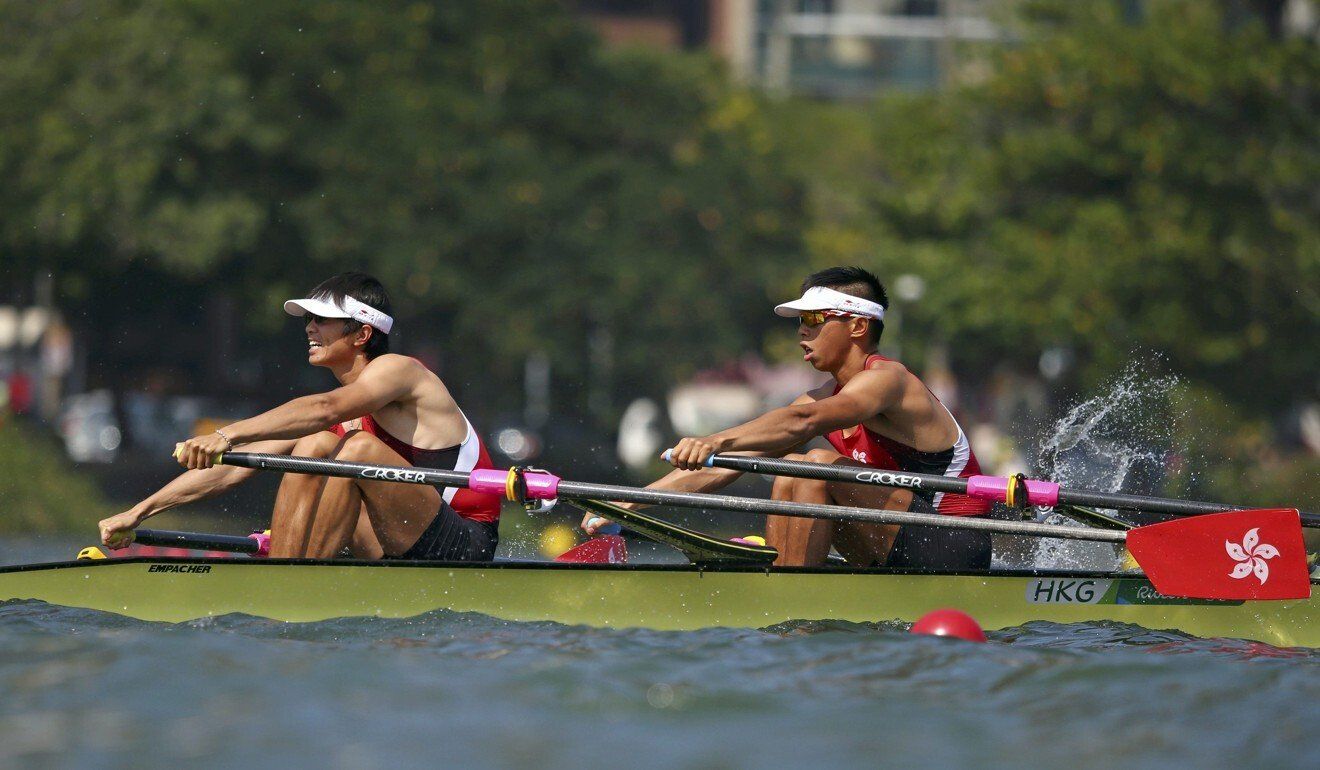 Hong Kong’s, men’s lightweight doubles team of Chiu Hin-chun and Tang Chiu-mang at the Rio Games.
Hong Kong’s, men’s lightweight doubles team of Chiu Hin-chun and Tang Chiu-mang at the Rio Games.
Perry couldn’t get anywhere without being smothered in the repellent-filled air, but there were hardly any mosquitoes. “After a few days, people stopped worrying about it, and there was never really a problem.”
Crime proved to be more of a problem than the tiny pests. The rowing team wanted to see some sights and enjoy Rio de Janeiro’s famed beaches, but venturing outside the Olympic Village could attract the unwanted attention of pickpockets. The city’s hillside slums had gun crimes and drug barons, making them no-go areas even for the police, Perry said.
Personal safety was the talk of the village but the tight security during the day meant he could climb to visit the Christ the Redeemer statue and swim at Copacabana with his team. The rough winds that blew from the sea and into the lagoon rowing course proved challenging for the Hong Kong rowing team but they ended up finishing their races.
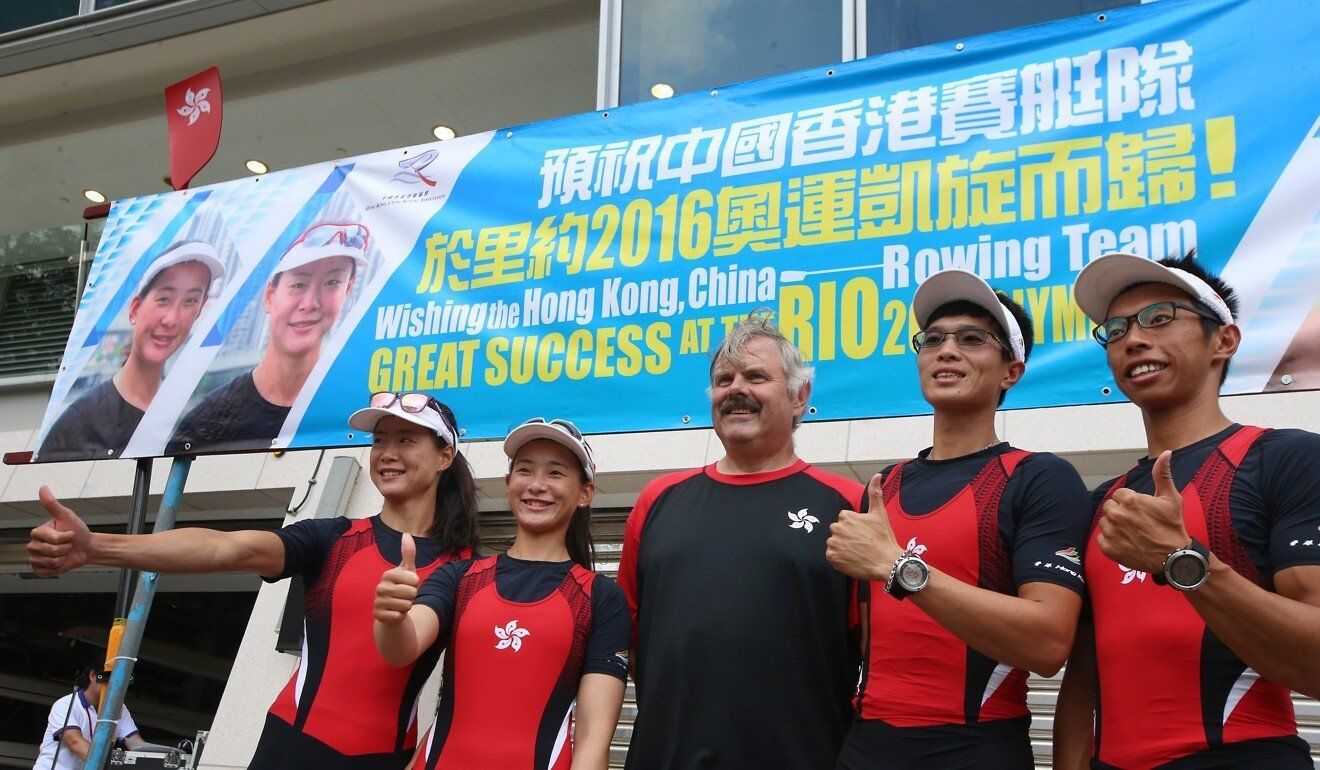 Chris Perry (centre) and Hong Kong’s Rio Olympic rowing squad meet the media before flying to Brazil.
Chris Perry (centre) and Hong Kong’s Rio Olympic rowing squad meet the media before flying to Brazil.
Before the Games were held, the organisers were criticised for being unprepared and the hefty price tag for hosting despite entrenched social inequality in Brazil.
“Rio didn’t have much money; everything was low-budget. But in the end, they did their best. We could criticise the food wasn’t as good, the Athletes’ Village wasn’t as good – sometimes the toilets didn’t work, or the water didn’t go out of the shower,” Perry said. “But they really did their best for a country that wanted to do it.
“They shared that feeling of being at the carnival. That’s what I liked about it. It’s that they couldn’t share a lot of money or luxury stuff, but they could share that Brazil passion for life.”
Looking forward to Tokyo
 Hong Kong’s six-strong rowing team for the Olympic trials in Tokyo wear
masks, shields and extra protective gear before leaving for Narita
Airport.
Hong Kong’s six-strong rowing team for the Olympic trials in Tokyo wear
masks, shields and extra protective gear before leaving for Narita
Airport.
Tokyo is likely to offer an experience athletes would remember for the rest of their lives, mostly for the stringent social-distancing measures in place. That means no sightseeing, no mingling in the Olympic Village, let alone getting in long queues for food.
“They will remember it as something that was in a unique time in the world where the world was being challenged a lot by this terrible virus,” Perry said.
But he’s confident the organisers would do well, given he and his team were in Tokyo for the qualifiers.
Having coached the Hong Kong squad for 35 years, the most enjoyable part of Perry’s job was being around and working with young athletes and seeing them achieve their dreams. Coaching has kept Perry young and he said it was a delight to see young athletes keep on going generation after generation.
“You look after them on international trips, you give them advice about all sorts of things, you pay attention to their career, their education, their family problems. For a short period of someone’s life, a coach is someone who has a lot of interaction and influence on younger athletes,” he said.
“If they later in life remember that as positive, if they remember that you have contributed something, that you’ve taught them something, not just sport, not just trying to win, but also about some principle of life, then I think you’ve done your job well.”















